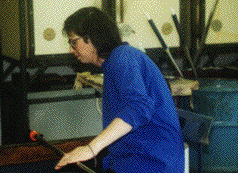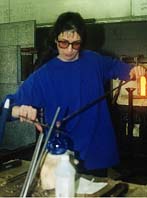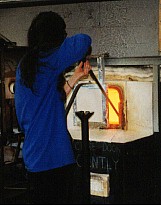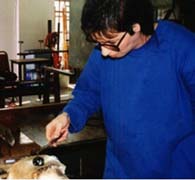RodiRovner:GlassArtisan |

|
|
|
|
RodiRovner:GlassArtisan |

|
|
|
|

|
|
|

|
|
|
|
Rodi feels that she has found the ultimate thing--GLASS. It is an art form that she loves and best of all, she can make money at it. "It is versatile and I can make things that I consider saleable--this is a paperweight, this is a vase, an ornament--and people buy those things." Though Rodi enjoys the public-access style and its educational environment, she would like to continue to search her soul for her creative "masterpiece." High-end studio work is what she really would like to do-- to express more of her artistic style. Unfortunately, as a mother and business owner, the bills need to be paid on a regular basis. Many glass workers rely on production work to keep the bills paid. They mass produce hand-crafted items for retail or wholesale purposes to ensure a steady income to support their art work. At the high-end of studio work, it is the artist's creative reputation that pays and that takes years of work and lots of exposure. It is a relative form of art -- purely to look at. The artist just creates and waits in hopes of some admiration and some financial reward.

Interesting Note: These days, Rodi will take each level as it comes,both with its challenges and rewards. She recently bartered some glass work for some dental work. "All these things (in my life) have just evolved so I feel like that's the way I'll continue...I have dreams of the future, but where I might go, what I might do?...for now, if it works--maybe this (the studio) will be my base." "I still have dreams of traveling to other countries in Europe and the Middle East to learn about other cultures and their glass history." With determination, skill and soul, Rodi Rovner will certainly have a great shot at fulfilling all her dreams. "If I don't try I will have failed, so I have to try."
Rodi's advice to other glass artisans:
"Paperweights, I know when I was in school--that was sort of frowned upon--'that's not high-level art.' I don't feel...that it's less important--I feel it's valuable to me as well. I mean maybe--maybe my higher goals are what you'd consider a work of art. You might not consider some of the other things you have to do as high as that, but don't worry about that--just keep on--take the detours (of life) and learn from them. Try to keep vision of your dream and evolve with it."